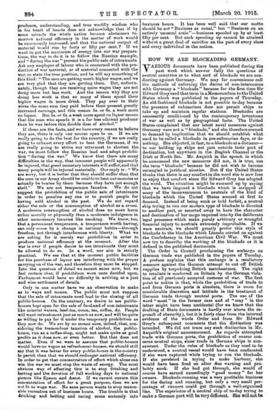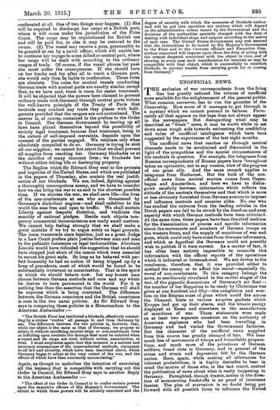HOW WE ARE BLOCKADING GERMANY.
VARIOUS documents have been published during the past week which answer fully the questions of neutral countries as to what sort of blockade we are con- ducting against Germany. We may for convenience call the methods of enforcing the decree of non-intercourse with Germany a "blockade" because for the first time Sir Edward Grey used that term in a Memorandum to the United States which was published in the papers of Thursday. An old-fashioned blockade is not possible to-day because the presence of submarines does not permit ships to take up and maintain regular stations. Blockades are necessarily conditioned by the contemporary inventions of war as well as by geographical facts. The United States complained that our latest naval measures against Germany were not a "blockade," and she therefore seemed to demand by implication that we should establish what used to be called a blockade in pre-submarine days, or do nothing. She objected, in fact, to a blockade at a distance— to our holding up ships not just outside their port of destination, but anywhere in the English Channel or the Irish or North Sea. Mr. Asquith in the speech in which he announced the new measures did not, it is true, use the term "blockade" because he did not wish to become entangled in juridical niceties. But if the United States thinks that there is any comfort in the word she is now free to enjoy that comfort since Sir Edward Grey has adopted the word. The situation might be summed up by saying that we have imposed a blockade which is stripped of many of the inconveniences to neutrals of the kind of blockade which the United States seemed at first to demand. Instead of being sunk or held forfeit, a neutral ship trying to run our modern type of blockade is directed to another port, or escorted away to have •the character and destination of her cargo inquired into by the deliberate legal processes which make purely arbitrary or wrongful financial injury to neutrals extremely improbable. If we were neutrals, we should greatly prefer this style of blockade to the blockade which Lincoln carried on against the Confederacy in the American Civil War. WO must now try to describe the working of the blockade as it is defined in the published documents. The Order in Council proclaiming the embargo an German trade was published in the papers of Tuesday. A preface explains that this embargo is a retaliatory measure against the German attempt to cut off British supplies by torpedoing British merchantmen. The right to retaliate is conferred on Britain by the German viola- tion of all previously accepted customs of war. The first point to notice is that, while the prohibition of trade to and from German ports is absolute, there is room for considerable discretion and latitude in the treatment of German trade through neutral ports. The use of the word " must " in the former case and of " may " in the latter might have been accidental (for we know that the drafting of State documents is hardly ever above the re- proach of obscurity), but it is fairly clear from the internal evidence of the whole Order and from Sir Edward Grey's subsequent comments that the distinction was intended. We did not trace any such distinction in Mr. Asquith's original announcement. As regards attempted trade with German ports, the prohibition of course con- cerns neutral ships, since 'trade in German ships is non- existent. Under the rules of blockade as they used to be understood, a neutral vessel would have been confiscated if she were captured 'while trying to run the blockade. If she persisted in trying to make harbour, she would have been fired on after due warning and pro- bably sunk. If she had got through. she would of course have earned exceedingly "good money " for her owners. Blockade-running was a very profitable business for the daring and cunning, but only a very small per- centage of runners could get- through a well-organized line. The experience of a neutral ship of to-day trying to
make a German port will be very different. She will not be confiscated at all. One of two things may happen. (1) She will be required to discharge her cargo at a British port, whore it will come under the jurisdiction of the Prize Court. The cargo may be requisitioned for British use and will be paid for, or else it may be restored to the owner. (2) The vessel may receive a pass, presumably to be granted at sea by a naval officer, which will enable her to continue her voyage to some Allied or neutral port, where her cargo will be dealt with according to the ordinary usages of trade. Of course, if the vessel abuses her pass she must suffer the consequences. If she should turn on her tracks and try after all to reach a German port, she would only then be liable to confiscation. These rules are absolute. The rules for neutral vessels conducting German trade with neutral ports are exactly similar, except that, as we have said, there is room for easier treatment. It will be objected that the powers here claimed to prevent ordinary trade with Germany through neutral ports violate the well-known principle of the Treaty of Paris that neutrals may conduct any trade they please with belli- gerents provided that the cargoes are not contraband. The answer is, of course, contained in the preface to the Order in Council. The German Government by tearing up all laws have placed themselves beyond the possibility of strictly legal treatment, because that treatment, being in the nature of self-imposed restraints, depends upon the consent of the parties engaged. We retaliate only when absolutely compelled to do so. Germany is trying to sink all our supplies; we cannot but retort that we shall prevent all supplies from reaching her. Germany blockades us at the sacrifice of many innocent lives ; we blockade her without either taking life or destroying property.
The Replies which Sir Edward Grey sent to the protests and inquiries of the United States, and which are published in the papers of Thursday, also contain the real justifi- cation of our blockade. We are, indeed, fighting against a thoroughly unscrupulous enemy, and we have to consider how we can bring the war to an end in the shortest possible time. If we shorten the war, we shall save life—the lives of the non-combatants at sea who are threatened by Germany's diabolical engines—and shall redeliver to the world the seas free and open to traffic. We shall sustain Liberty against despotic dictation, and vindicate the sanctity of national pledges. Beside snob objects tem- porary commercial inconveniences are really small matters. We cannot help feeling strongly that we shalt make a great mistake if we try to argue solely on legal grounds. The issue transcends more legalism, just as a great Judge in a Law Court prefers plain justice between man and man to the pedantic insistence on legal technicalities. Abraham Lincoln would have ridiculed the suggestion that be should have stopped just short of the means which were essential to secure his great ends. So long as he behaved with per- fect humanity he had no notion of being tripped up by a heap of precedents, most of whioh would be found to be substantially irrelevant on examination. That is the spirit in which we should behave now. Let any honest man choose between German methods and ours and say which he desires to have paramount in the world For it is nothing less than the assertion that the German will shall be supreme which is being contested. The difference between the German conscience and the British conscience is seen in the two naval policies. As Sir Edward Grey says in comparing these policies in a Memorandum to the American Ambassador :— " The British Fleet has instituted a blockade, effectively control- ling by a cruiser 'cordon' all passage to and from Germany by sea. The difference between the two policies le, however, that, while our object is the same as that of Germany, we propose to attain it without sacrificing neutral ships or non-combatant lives or inflicting upon neutrals the damage that must be entailed when a vessel and its cargo are slink without node°, examination, or triaL I must emphasise again that this measure is a natural and necessary consequence of the unprecedented methods, repugnant to all law and morality, which have been described above, which Germany began to adopt at the very outset of the war, and the effects of which have been constantly accumulating."
Again, as though to underline the intention of exercising all the leniency that is compatible with carrying out the Order in Council, Sir Edward Grey says in another Reply to the American Ambassador :— " The effect of the Order in Council is to confer certain powers upon the executive officers of -Ilia hajeaty's Government. The extent to which those powers will be actually exercised and the degree of severity with which the measures of blockade author- ized will be put into operation are matters which will depend on the administrative orders issued by the Government and the decisions of the authorities specially charged with the duty of dealing with individual ships and cargoes according to the merits of each ease. The United States Government may rest assured that the instructions to be issued by Ilia Majesty's Government to the Fleet and to the Customs officials and Executive Com- mittees concerned will impress upon them the duty of acting with the utmost despatch consistent with the object in view, and of showing in every caste such consideration for neutrals as may be compatible with that object, which is successfully to establish blockade, to prevent vessels from carrying goods for or coming from Germany."







































 Previous page
Previous page